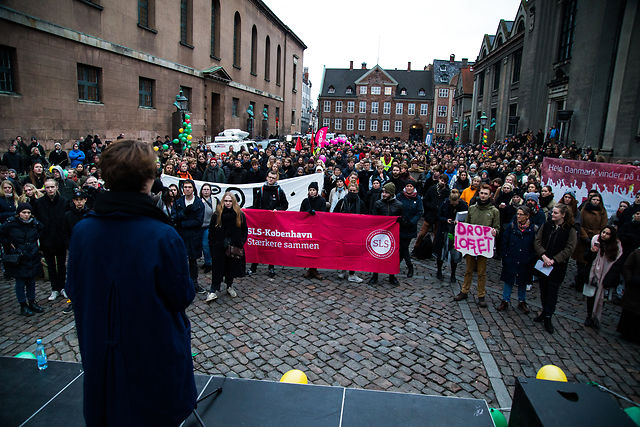EDUCATION
Denmark passes ‘education cap’ despite protests
The Danish parliament on Monday passed a bill that will bar students from taking a second university degree.
Published: 19 December 2016 09:06 CET
Updated: 19 December 2016 12:33 CET
Updated: 19 December 2016 12:33 CET

Demonstrators protest against the 'education cap' outside of the University of Copenhagen on Sunday. Photo: Martin Sylvest/Scanpix
The bill restricts individuals who already have a higher education degree from pursuing a degree in another field at the same or a lower level.
The plan’s backers say the move will save 300 million kroner per year that can instead be used to fund the dagpenge unemployment system but critics say that limiting students’ abilities to change their course of studies can lock them in to poor choices and limit their future employment possibilities.
Nearly 80,000 Danes signed a petition protesting the bill, arguing that the so-called ‘double education cap’ will not only hurt students but will rob society of future skilled workers.
The petition argues that “thousands of students will be stuck in an education in which they can’t see a future”.
“The brightest and most ambitious young people will look abroad for the education they want. We run the risk that they will not return to Denmark with their knowledge,” the petition states, adding that the education cap is “short-sited”.
“If the bill is passed, it's going to mean that thousands of students will be locked into their education without the ability to change their minds. We are already experiencing enormous uncertainty, and many have already taken the consequences of this hopeless bill by dropping out of their education,” a Facebook group organizing a Sunday protest against the bill wrote.
The bill was supported by the three government parties as well as the Danish People’s Party and the Social Democrats. Its backers say the move is a matter or priorities.
“I think it can be defended. You need to take it for what it is: the result of a political prioritization.” Higher Education Minister Søren Pind said, adding that it was “the least bad” option for finding 300 million kroner that the bill’s supporters say is need to shore up funding in the dagpenge system.
“Sometimes we make laws and are forced to say that if we had all the money in the world, this wouldn’t be where we would make limitations. But we don’t have all the money in the world, so we think this is fair,” Christine Antorini of the Social Democrats said.
News agency Ritzau reports that up to 2,200 students each year will be impacted by the bill but the government estimates that around 30 percent of those will be able to qualify for a dispensation for either health reasons or because their first education has become obsolete.
Url copied to clipboard!


 Please whitelist us to continue reading.
Please whitelist us to continue reading.
Member comments